

Mutualism (movement) Mutualism (also known as the mutualist movement or movement of mutuals) is a social movement that aims at creating and promoting mutual organizations, mutual insurances, and mutual funds.
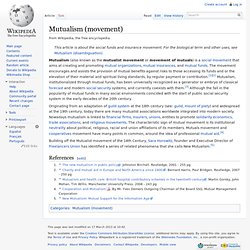
European Social Charter. Trust law. The trustee may be either an individual, a company, or a public body.

There may be a single trustee or multiple co-trustees. Subsidiarity. Subsidiarity is an organizing principle of decentralisation, stating that a matter ought to be handled by the smallest, lowest, or least centralised authority capable of addressing that matter effectively.
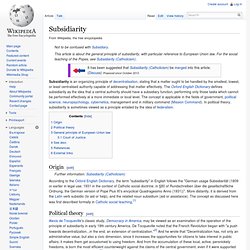
The Oxford English Dictionary defines subsidiarity as the idea that a central authority should have a subsidiary function, performing only those tasks which cannot be performed effectively at a more immediate or local level. The concept is applicable in the fields of government, political science, neuropsychology, cybernetics, management and in military command (Mission Command).
Sovereignty. Sovereignty is understood in jurisprudence as the full right and power of a governing body to govern itself without any interference from outside sources or bodies.
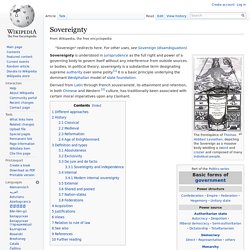
In political theory, sovereignty is a substantive term designating supreme authority over some polity.[1] It is a basic principle underlying the dominant Westphalian model of state foundation. Derived from Latin through French souveraineté, its attainment and retention, in both Chinese and Western [2] culture, has traditionally been associated with certain moral imperatives upon any claimant. Different approaches[edit] The concept of sovereignty has been discussed throughout history, from the time before recorded history through to the present day.[3][4] It has changed in its definition, concept, and application throughout, especially during the Age of Enlightenment. The current notion of state sovereignty contains four aspects consisting of territory, population, authority and recognition.[5] According to Stephen D. Confederation. The nature of the relationship among the states constituting a confederation varies considerably.
Likewise, the relationship between the member states, the central government, and the distribution of powers among them is highly variable. Some looser confederations are similar to intergovernmental organizations and even may permit secession from the confederation. Other confederations with stricter rules may resemble federations. A unitary state or federation may decentralize powers to regional or local entities in a confederal form. In a non-political context, confederation is used to describe a type of organization which consolidates authority from other autonomous (or semi-autonomous) bodies.
Proxy voting. Proxy voting is a form of voting whereby some members of a decision-making body may delegate their voting power to other members of the same body to vote in their absence, and/or to select additional representatives.
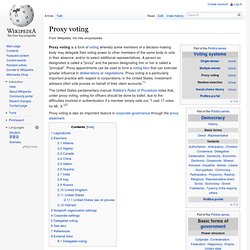
A person so designated is called a "proxy" and the person designating him or her is called a "principal". Proxy appointments can be used to form a voting bloc that can exercise greater influence in deliberations or negotiations. Proxy voting is a particularly important practice with respect to corporations; in the United States, investment advisers often vote proxies on behalf of their client accounts.[1] The United States parliamentary manual Riddick's Rules of Procedure notes that, under proxy voting, voting for officers should be done by ballot, due to the difficulties involved in authentication if a member simply calls out, "I cast 17 votes for Mr. X Proxy voting is also an important feature in corporate governance through the proxy statement. Legislatures[edit] Thomas E. E-democracy. E-democracy (a combination of the words electronic and democracy) incorporates 21st-century information and communications technology to promote democracy.
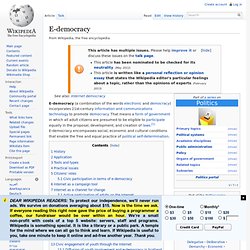
That means a form of government in which all adult citizens are presumed to be eligible to participate equally in the proposal, development, and creation of laws.[1] E-democracy encompasses social, economic and cultural conditions that enable the free and equal practice of political self-determination. History[edit] Deliberative democracy. Deliberative democracy or discursive democracy is a form of democracy in which deliberation is central to decision making.
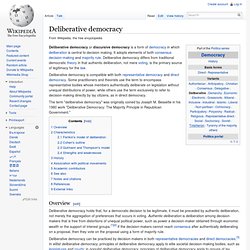
It adopts elements of both consensus decision-making and majority rule. Deliberative democracy differs from traditional democratic theory in that authentic deliberation, not mere voting, is the primary source of legitimacy for the law. Deliberative democracy is compatible with both representative democracy and direct democracy. Some practitioners and theorists use the term to encompass representative bodies whose members authentically deliberate on legislation without unequal distributions of power, while others use the term exclusively to refer to decision-making directly by lay citizens, as in direct democracy. The term "deliberative democracy" was originally coined by Joseph M. Overview[edit] Participatory democracy.
Direct democracy. Direct democracy (also known as pure democracy)[1] is a form of democracy in which people decide (e.g. vote on, form consensus on, etc.) policy initiatives directly, as opposed to a representative democracy in which people vote for representatives who then decide policy initiatives.[2] Depending on the particular system in use, it might entail passing executive decisions, the use of sortition, making laws, directly electing or dismissing officials and conducting trials.
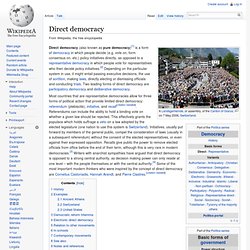
Two leading forms of direct democracy are participatory democracy and deliberative democracy. Most countries that are representative democracies allow for three forms of political action that provide limited direct democracy: referendum (plebiscite), initiative, and recall[citation needed]. Referendums can include the ability to hold a binding vote on whether a given law should be rejected. Coalition government.
Open government. Open government is the governing doctrine which holds that citizens have the right to access the documents and proceedings of the government to allow for effective public oversight.[1] In its broadest construction it opposes reason of state and other considerations, which have tended to legitimize extensive state secrecy.
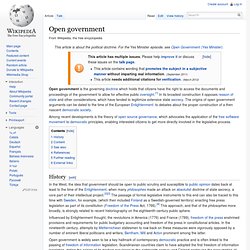
The origins of open government arguments can be dated to the time of the European Enlightenment: to debates about the proper construction of a then nascent democratic society. Among recent developments is the theory of open source governance, which advocates the application of the free software movement to democratic principles, enabling interested citizens to get more directly involved in the legislative process. History[edit] Influenced by Enlightenment thought, the revolutions in America (1776) and France (1789), freedom of the press enshrined provisions and requirements for public budgetary accounting and freedom of the press in constitutional articles. Group decision making. Group decision-making (also known as collaborative decision-making) is a situation faced when individuals collectively make a choice from the alternatives before them.
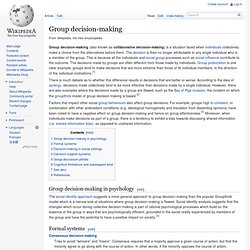
The decision is then no longer attributable to any single individual who is a member of the group. This is because all the individuals and social group processes such as social influence contribute to the outcome. The decisions made by groups are often different from those made by individuals. Group polarization is one clear example: groups tend to make decisions that are more extreme than those of its individual members, in the direction of the individual inclinations.[1] There is much debate as to whether this difference results in decisions that are better or worse. Factors that impact other social group behaviours also affect group decisions. Consensus decision-making. Members of the Shimer College Assembly reaching a consensus through deliberation.
Consensus decision-making is a group decision-making process that seeks the consent of all participants. Consensus may be defined professionally as an acceptable resolution, one that can be supported, even if not the "favourite" of each individual. Consensus is defined by Merriam-Webster as, first, general agreement, and second, group solidarity of belief or sentiment.